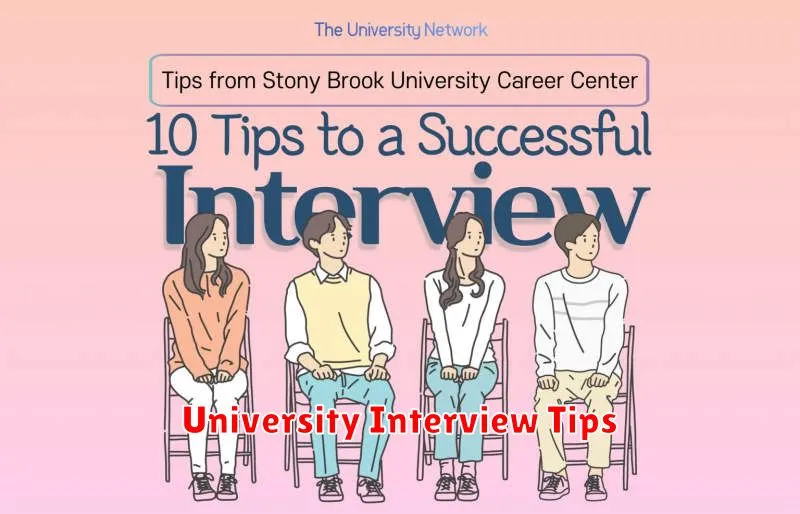Preparing for a university interview can be a daunting task, especially when the competition is fierce and each candidate seems equally qualified. As applicants strive to make a lasting impression, knowing the right university interview tips can significantly bolster your chances of standing out from the crowd. In this comprehensive guide, we’ll delve into essential strategies and insights designed to help you navigate this critical part of the college admission process. From mastering your communication skills to understanding the expectations of your interviewers, our goal is to equip you with the tools you need to make a memorable impact and secure your place at a top university.
Why Some Universities Require Interviews
Universities often require interviews as part of their admissions process to obtain a more comprehensive understanding of the applicant beyond what is provided in transcripts and test scores. These interviews help admissions officers assess personal attributes such as communication skills, sincerity, and alignment with the university’s values.
Interviews offer a platform to evaluate an applicant’s ability to articulate experiences and aspirations clearly. For certain programs, particularly those with a focus on public speaking or interpersonal communication, interviews are critical in determining an applicant’s potential for success. They also serve as a means for the institution to gauge an applicant’s enthusiasm and genuine interest in the program, ensuring that candidates are aligned with the educational missions and values of the university.
Furthermore, the interview gives applicants the chance to ask questions, thereby providing insights from both sides, fostering a mutual understanding of expectations. This holistic assessment approach is especially significant for competitive programs where distinguishing between candidates who meet the academic criteria requires additional evaluation beyond grades and test scores.
How to Prepare for Common Interview Questions
Preparing for a university interview requires dedicated attention to common questions that candidates often face. To stand out from the crowd, it is crucial to be well-prepared and articulate.
Begin by researching the types of questions frequently asked in university interviews. These typically include inquiries about your academic interests, why you are interested in the program, and how you plan to contribute to the university community. This familiarization process will help build your confidence and ensure you are not caught off guard.
Practicing your responses can be highly beneficial. Consider conducting mock interviews with a friend or mentor to receive constructive feedback. Pay attention to delivering your answers with clarity and confidence. Embodying poise can make a significant difference in how your responses are perceived.
Furthermore, it is important to personalize your answers. Reflect on your unique experiences and how they relate to your goals and aspirations. This approach can help differentiate you from other candidates and demonstrate your genuine interest in the program.
Lastly, be prepared to ask insightful questions about the program. This not only shows your enthusiasm but also reflects your critical thinking abilities. By thoroughly preparing for common interview questions, you increase your chances of making a lasting impression and successfully standing out in a competitive field.
Dress Code and Body Language Tips

Making a strong impression during a university interview begins with presenting yourself through an appropriate dress code and mindful body language. Dressing appropriately signals seriousness and respect towards the opportunity at hand. It is recommended to adhere to a business casual attire unless instructed otherwise by the institution. This typically includes a neat and tidy appearance, such as a collared shirt or blouse and tailored pants or a skirt. Remember, the key is to feel comfortable yet professional.
Your body language plays a crucial role in communicating confidence and enthusiasm. Sit up straight to convey attentiveness, and maintain a neutral or slightly forward lean to show interest. Ensure your eye contact is consistent yet natural, as it signifies engagement and honesty.
A firm handshake can leave a lasting impression at the beginning and end of your interview. Coupled with a genuine smile, it portrays warmth and approachability. Reinforce your verbal responses with subtle gestures, but be careful not to overdo them. Such non-verbal cues can enhance your communication, making your responses more dynamic and engaging.
Additionally, it is important to practice moderation in facial expressions. Too little expression can render you seemingly disinterested, while too much might overwhelm your interviewer. Aim for a balanced demeanor that reflects your natural state but still acknowledges conversational cues appropriately.
By giving careful attention to both dress code and body language, you will present a polished and confident image, helping you stand out in the competitive university admission process.
Demonstrate Interest and Knowledge About the Program
One key way to stand out in a university interview is to clearly demonstrate your interest and knowledge about the program you are applying for. This shows the interviewers that you are serious about becoming a part of their community.
Before the interview, thoroughly research the program. Understand its core values, specific courses, faculty members, and any unique opportunities it offers, such as internships or study abroad options. Be prepared to discuss how these align with your academic interests and career goals.
During the interview, incorporate your research naturally into your responses. For instance, you might say, “I am very impressed by the faculty’s work in [specific area], and I am eager to learn from them,” or “The opportunity to participate in the [specific program feature] is an aspect that excites me greatly.”
Ask thoughtful questions that show you have done your homework. Questions like, “Can you share more about the recent developments in the [specific department]?” reflect a deeper engagement with the program.
In summary, showing genuine enthusiasm and a well-rounded understanding of the program will not only help you differentiate yourself from other applicants but also make a compelling case for why you are a perfect fit for the university.
Practice Mock Interviews with Friends or Mentors
Engaging in mock interviews with friends or mentors is an invaluable strategy when preparing for a university interview. The experience allows you to simulate the real interview environment, helping to boost your confidence and polish your responses.
Have your friends or mentors role-play the interviewers and pose challenging questions that you might encounter during the real interview. This approach not only helps anticipate potential questions but also enables you to practice articulating your thoughts concisely under pressure.
Additionally, feedback from peers or mentors is crucial. They can provide constructive criticism on your body language, tone, and clarity, allowing you to make necessary improvements. By repeatedly honing these aspects, you increase your chances of standing out in the actual interview.
Mock interviews also acquaint you with the interview structure and timing, reducing anxiety on the big day. As you become more comfortable with the process, your genuine personality and enthusiasm for your chosen field are more likely to shine through.
Questions You Should Ask the Interviewer
A university interview is not just an opportunity for the panel to evaluate you, but also for you to assess the university’s fit for your educational needs. By asking insightful questions, you can demonstrate your genuine interest and critical thinking skills.
First, inquire about the university’s academic resources. Asking about specific facilities, such as libraries or laboratories, shows that you are serious about your academic pursuits and committed to utilizing the resources available.
Secondly, seek clarification on the program’s curriculum. Questions regarding elective options, practical components, or internships not only highlight your proactive attitude but also help you understand what you will gain from their program.
Additionally, don’t shy away from asking about student support services. Knowing the available resources for mental health, career advice, and academic assistance can be crucial for your well-being and success during your studies.
Lastly, it’s beneficial to ask about the university’s campus culture. Inquiring about extracurricular activities, student organizations, and community engagement opportunities reflects your intention to contribute to and engage with the campus community.
By preparing and asking these thoughtful questions, you signal to the interviewer that you are a motivated and discerning candidate, ready to make an informed decision about your educational future.
Follow-Up Etiquette After the Interview
After your university interview, adhering to proper follow-up etiquette can significantly impact the impression you leave. It is essential to send a thank you email to the interviewer within 24-48 hours. This demonstrates your appreciation for the opportunity and reiterates your genuine interest in the program.
In your message, make sure to express specific points from the interview that resonated with you, as this reflects active listening and genuine engagement. Additionally, use this chance to briefly restate why you are a suitable candidate for the university, tying back to the conversation you had.
Maintain a professional tone in your communication and double-check for any grammatical or typographical errors. Ending with a courteous note conveys politeness and respect, a simple “thank you again for your time” suffices and leaves a positive last impression.
While it’s appropriate to follow up once, avoid excessive communication as it can appear unprofessional. If the interviewer provided a timeframe for a response, be patient and wait until after that period before considering further contact.
What to Do If You Don’t Get Selected
Receiving a rejection after a university interview can be disheartening, but it’s important to view it as an opportunity for growth and self-improvement. First, allow yourself to process the disappointment and reflect on the experience.
Consider reaching out to the admissions office for feedback on your interview performance. This will help you understand your areas of strength and areas that need improvement, enabling you to better prepare for future interviews.
Use this experience to enhance your application skills. Revise your personal statement, emphasize your achievements, and gather stronger recommendations. Each of these steps can significantly bolster your candidacy in subsequent applications.
Moreover, keep your options open. Look into other universities or programs that align with your goals, and apply to them as well. Sometimes, a rejection can lead you to an opportunity better suited to your personal and academic aspirations.
It’s essential to remain persistent and focused on your goals. A rejected application does not define your capabilities or potential. Stay optimistic, recognize your worth, and continue your pursuit of higher education with renewed determination.

